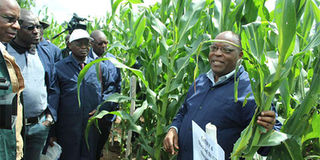Farmers can now afford better produce with nuclear technology

Kalro Director General Dr Eliud Kireger (right) examines a maize plant infested by Fall armyworm with Dr Stephen Mugo, a maize breeder. Investment in nuclear technology will go a long way in shielding farmers from these losses. PHOTO | TONNY OMONDI | NATION MEDIA GROUP
What you need to know:
Isotopic techniques make it easy to regulate the amount of nitrogen, which is necessary for the healthy growth of plants.
In South Africa, nuclear technology has saved the Western Cape orange industry, once on the brink of extinction.
With affordable sustainable energy, we could dry and treat crops such as cereals, legumes and fish to reduce moisture content, increasing their shelf life.
Nowadays, in the age of technological revolutions, breakthroughs in all sectors of the economy are deeply intertwined and complement one another.
Given that technology and agriculture tend to go hand in hand, the innovative feats are being successfully employed in the sector across Africa.
When nuclear technology as a thematic issue in agriculture sector is mentioned, four main areas of development emerge: A decline in pests or insects, increased crop production, improved food processing and improved animal health.
In Benin, soybean farmers can triple their income using benefits of nuclear irradiation.
POSITIVE EFFECT
Isotopic techniques make it easy to regulate the amount of nitrogen, which is necessary for the healthy growth of plants.
After close cooperation with scientists, they saw crops triple or quadruple—a fantastic result for a country highly dependent on soybean exports.
The Nigerian Senate Committee of Science and Technology chairman, Prof Ajayi Boroffice, argues that the synergy between agriculture and energy technologies can have quite a positive effect on economic efficiency of the industry.
Thus, development of agriculture should not be neglected but put on a premium as potentially one of the most vibrant economic sectors in the consumer industry.
NUCLEAR TECHNOLOGY
But the conversation ought to revolve around how energy technologies plug into mainstream economic sectors.
How does provision of nuclear energy onto the grid supplement agriculture?
In South Africa, nuclear technology has saved the Western Cape orange industry, once on the brink of extinction.
Nuclear science helped farmers to put an end to infestation that damaged the environment, seriously affecting the citrus industry which employed 10 per cent of South Africa’s agricultural labour force.
PEST CONTROL
Farmers used the sterile insect technique—a form of insect pest control that uses ionizing radiation to sterilize pests that are mass-produced in special rearing facilities.
The sterile insects are released systematically from the ground or by air over pest-infested areas, where they mate with wild populations, which, subsequently, do not produce offspring.
In the few cases when sterilized males and wild females do have an offspring, it is always a sterile male.
This technique can suppress and, in some cases, eventually eradicate populations of insect pests. It is among the most environmentally friendly tactics and is usually applied as part of an integrated campaign to control insect populations.
Through it, Zanzibar declared itself tsetse-free by 1997.
FOOD IRRADIATION
Food irradiation is life-saving technology as it eradicates bacteria and parasites that can cause food-borne diseases.
The World Health Organization (WHO) says 600 million people suffer from consuming contaminated food each year with Africa having the highest level of food-borne diseases at more than 90 million people falling ill and 130,000 dying.
The importance of nuclear technologies in agriculture is as high as never before.
Nigeria, with one nuclear science facility that can operate in six modes, plans to boost its economic and scientific potential.
POST-HARVEST LOSS
In Kenya, adequate energy supply would make it possible to address huge challenges of post-harvest loss.
With affordable sustainable energy, we could dry and treat crops such as cereals, legumes and fish to reduce moisture content, increasing their shelf life.
More African emerging counties are mulling beefing up nuclear capacities.
Zambia plans to build a nuclear university and install a special radioisotope complex with the help of Russian partners.
Some 25-30 per cent of the food harvested in many developing countries is lost because of spoilage by microbes and pests.
The reduction of such spoilage is of the utmost importance, particularly in countries with and humid climates, calling for embracing of nuclear technology.
The writer is an energy expert, economics and policy analysis lecturer at Karatina University School of Business (Kenya) and the engagement lead for The Extractive Hub (Kenya). Email: [email protected]





